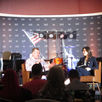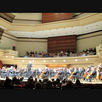Wheaton College Artist Series presented Vivaldi’s The Four Seasons
- Jan 31, 2022
- 5 min read
Updated: Apr 12, 2023

Photo: Camerata Chicago, courtesy of Natalia Dagenhart
Although I like winter, the cold and snowy weather this January made me want to find a place that would warm me up both emotionally and physically. After searching for a while, I was extremely excited to find out that Wheaton College Artist Series returned last fall and that their next concert program would be exactly what I wanted to attend! They were about to present one of my favorite compositions - The Four Seasons by Antonio Vivaldi. I had to attend this event, and I had to write about it. So, on Saturday, January 29, at 7:30 p.m. I was at Edman Chapel in Wheaton.
This breathtaking spacious chapel was maybe three quarters full of people, which proved one more time that we all are hungry for live musical events. In other words, we want to live fully, and attending classical music events is one of the elements of a full and happy life.
As the Artist Series newsletter said about its 2021-2022 concert season, “This will be a year of unusual riches, as the Wheaton College Artist Series will be joined by many other campus programs celebrating the Year of the Arts, Faith, & Imagination.” The Four Seasons concert program became one of the greatest examples of celebrating arts, faith and imagination, and I would have missed a lot that night if I would have chosen not to attend it.
The concert program featured Camerata Chicago, a chamber orchestra that was founded in 2003 by native British conductor Drostan Hall. The orchestra serves Chicago and its surrounding communities with performances of great music featuring musicians of global distinction. Maestro Hall is a world renowned conductor with incredible energy, unbeatable charisma, and extreme musicality. To attend performances under his directorship means not only to listen to music, but also to educate yourself about composers and their compositions.
“We are committed to providing an incomparable concert experience which enriches the community and inspires the next generation of musicians and concert-goers,” says the Camerata Chicago website. The Four Season concert program proved this message by demonstrating the talent of the young musicians who participated in it.
The first half of the program featured two concertos written by Antonio Vivaldi about 300 years ago. Interestingly, Vivaldi's music still sounds fresh and up-to-date after three centuries of human evolution. Maestro Hall and the Camerata Chicago musicians had to find a way to demonstrate the elegance and virtuosity of the music of those days, and the young soloists had to do the same. They did a great job reflecting the composer’s musical intentions, his feelings and the mood that he chose for these compositions.
The first concerto that was performed that night was Concerto in G minor for two cellos, strings and continuo, RV 531. It consists of Allegro, Largo, and Allegro. The first part, Allegro, featured two young cellists: 7th grade student Wren Page and senior Drake Strutzel. Page has studied cello at Wheaton College Community School of the Arts (CSA) with Carol Ourada. She performs with the CSA Cello Choir, Vivaldi Strings, and chamber groups, has participated in the Suzuki Youth Orchestra of the Americas, and is a member of the Naperville Youth Symphony Encore Orchestra.
Drake Strutzel has studied the cello with Carol Ourada since he was 5 years old. He participates in the Wheaton North High School Orchestra, CSA ensembles, cello choir, the Naperville Young Symphony Orchestra, St. John Winds and Strings, and plays solo and group gigs around the area. Both Page and Strutzel were able to masterfully present their solo parts in this flaring movement.
Largo, the second movement, featured two more young cellists: Lauren Gabis and Gerrit Vanderschoot. Gabis is a senior student who began playing cello at age 7 and has studied with Carol Ourada at CSA since 7th grade. She performs with the Barrington High School Orchestra, the Barrington Youth Symphony Orchestra, the CSA Cello Choir, chamber ensembles and a touring international orchestra.
Gerrit Vanderschoot is a junior student who began studying the cello at CSA in the 1st grade with Jesse McAdoo and has studied 9 years with Diane Chou. At CSA he has performed with cello choir, Vivaldi Strings, and chamber ensembles. In 2020 and 2021 he was selected for ILMEA District Festival, and the All-State Festival in 2020. Both Gabis and Vanderschoot impressed the audience with their touching solo performances of this thoughtful movement.
The third movement, Allegro, featured Ariyo Akinyemi and Wren Page. Akinyemi has studied the cello since age 6 with Carol Ourada at the CSA. He is a member of the Naperville Youth Symphony Encore Orchestra and the CSA Cello Choir. He has participated with the Vivaldi Strings, chamber groups, and the Chicago Music Pathways Initiative. Akinyemi and Page found the best way to present their solo parts of this expressive and elegant movement.
After that, Camerata Chicago presented Vivaldi’s Concerto in A minor for violins, strings and continuo, Op. 3. No. 6 L’estro armonico. It featured talented violinist Rika Seko. Seko graduated from Tokyo University of Arts. She began her professional career in Bogota, Colombia in 1986, first as guest Concertmaster of the Colombia Symphony, then as Assistant Concertmaster in the Bogota Philharmonic Orchestra. Since moving to Chicago in 1994 Rika has appeared with many Chicago-area orchestras including Chicago Philharmonic, Lyric Opera of Chicago and Camerata Chicago. As soloist she has performed with Peninsula Music Festival Orchestra and Elmhurst Symphony Orchestra. Currently she is Concertmaster at Elmhurst Symphony and a member of Grant Park Music Festival Symphony, Music of the Baroque, Fulcrum Point New Music Project and Associate Concertmaster of Camerata Chicago.
This touching composition consists of three parts: Allegro, Largo, Presto. Seko masterfully presented her solo in all three of them - elegant Allegro, thoughtful Largo, and fast and well structured Presto. She found the best way to demonstrate the composer’s feelings and musical ideas that he impressed in this immortal masterpiece of the Baroque era.
The second part of this concert program featured The Four Seasons. Maestro Hall found a way to demonstrate this musical gem by combining it with the poetry created by the composer, as this composition is based on four poems written by Antonio Vivaldi. Each "Season" consists of a three-movement concerto. As in other concertos written by Vivaldi, two quick-tempo outer movements frame a central slow-tempo movement. Each sonnet provides a specific description of each movement.
Actress Kailey Bell read verses created by Vivaldi before each part of this composition with great talent and expression. Bell is a Chicago-based professional actress with a great number of various roles that she has performed during her career. She also has worked as an adjunct professor at Wheaton College. In The Four Seasons, Bell helped to demonstrate the whole spectrum of the composer’s feelings and senses related to the seasons and their reflection in music. Each of the four sonnets is in turn divided into three phrases or ideas, reflected in the three movements of each concerto.
I can’t post all of the sonnets in this review, but I chose to end this article with L'Inverno (Winter), as we are going through cold and snowy months now. Enjoy it and please rely on the Wheaton College Artist Series next time you need a place that is ready to give you happiness and joy!
I. Allegro non molto--
Frozen and trembling in the icy snow,
In the severe blast of the horrible wind,
As we run, we constantly stamp our feet,
And our teeth chatter in the cold.
II. Largo--
To spend happy and quiet days near the fire,
While, outside, the rain soaks hundreds.
III. Allegro--
We walk on the ice with slow steps,
And tread carefully, for fear of falling.
Symphony, If we go quickly, we slip and fall to the ground.
Again we run on the ice,
Until it cracks and opens.
We hear, from closed doors,
Sirocco, Boreas, and all the winds in battle.
This is winter, but it brings joy.
Natalia Dagenhart
1/31/2022
This article is also available at:

























Comments